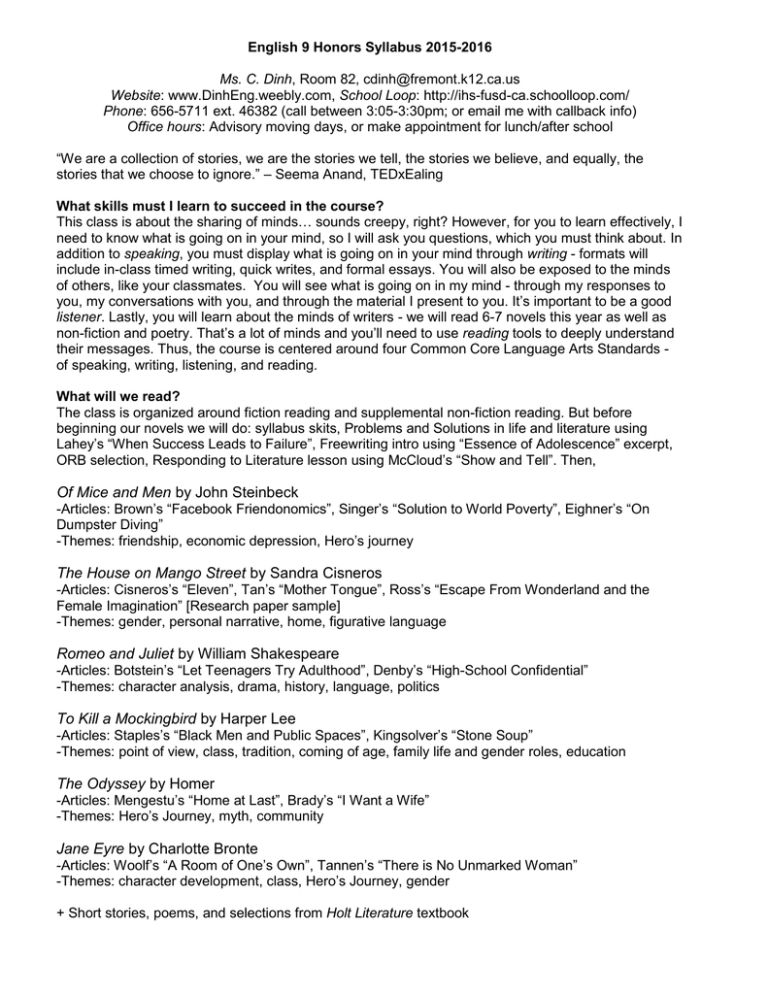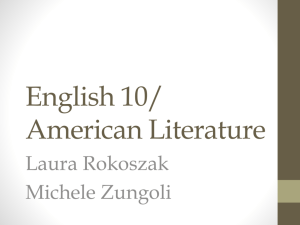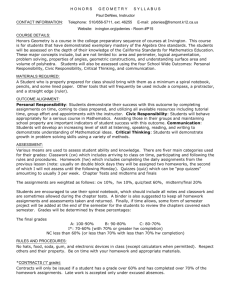File - Eng 9 Honors . Eng 11 CP
advertisement

English 9 Honors Syllabus 2015-2016 Ms. C. Dinh, Room 82, cdinh@fremont.k12.ca.us Website: www.DinhEng.weebly.com, School Loop: http://ihs-fusd-ca.schoolloop.com/ Phone: 656-5711 ext. 46382 (call between 3:05-3:30pm; or email me with callback info) Office hours: Advisory moving days, or make appointment for lunch/after school “We are a collection of stories, we are the stories we tell, the stories we believe, and equally, the stories that we choose to ignore.” – Seema Anand, TEDxEaling What skills must I learn to succeed in the course? This class is about the sharing of minds… sounds creepy, right? However, for you to learn effectively, I need to know what is going on in your mind, so I will ask you questions, which you must think about. In addition to speaking, you must display what is going on in your mind through writing - formats will include in-class timed writing, quick writes, and formal essays. You will also be exposed to the minds of others, like your classmates. You will see what is going on in my mind - through my responses to you, my conversations with you, and through the material I present to you. It’s important to be a good listener. Lastly, you will learn about the minds of writers - we will read 6-7 novels this year as well as non-fiction and poetry. That’s a lot of minds and you’ll need to use reading tools to deeply understand their messages. Thus, the course is centered around four Common Core Language Arts Standards of speaking, writing, listening, and reading. What will we read? The class is organized around fiction reading and supplemental non-fiction reading. But before beginning our novels we will do: syllabus skits, Problems and Solutions in life and literature using Lahey’s “When Success Leads to Failure”, Freewriting intro using “Essence of Adolescence” excerpt, ORB selection, Responding to Literature lesson using McCloud’s “Show and Tell”. Then, Of Mice and Men by John Steinbeck -Articles: Brown’s “Facebook Friendonomics”, Singer’s “Solution to World Poverty”, Eighner’s “On Dumpster Diving” -Themes: friendship, economic depression, Hero’s journey The House on Mango Street by Sandra Cisneros -Articles: Cisneros’s “Eleven”, Tan’s “Mother Tongue”, Ross’s “Escape From Wonderland and the Female Imagination” [Research paper sample] -Themes: gender, personal narrative, home, figurative language Romeo and Juliet by William Shakespeare -Articles: Botstein’s “Let Teenagers Try Adulthood”, Denby’s “High-School Confidential” -Themes: character analysis, drama, history, language, politics To Kill a Mockingbird by Harper Lee -Articles: Staples’s “Black Men and Public Spaces”, Kingsolver’s “Stone Soup” -Themes: point of view, class, tradition, coming of age, family life and gender roles, education The Odyssey by Homer -Articles: Mengestu’s “Home at Last”, Brady’s “I Want a Wife” -Themes: Hero’s Journey, myth, community Jane Eyre by Charlotte Bronte -Articles: Woolf’s “A Room of One’s Own”, Tannen’s “There is No Unmarked Woman” -Themes: character development, class, Hero’s Journey, gender + Short stories, poems, and selections from Holt Literature textbook If students lose any books, they will be responsible for paying the replacement fee(s) back to Irvington High School. You MUST return each book before you can check out the next novel or play. Final test and essay grades will not be counted until the book is either paid for or replaced. Reading homework will typically be 20 pages every weeknight. Outside Reading Book (ORB) Report: Each quarter, you are required to choose a grade-appropriate fiction or non-fiction book at least 250 pages long. You must read it and complete a project, which will be specified, due at the end of the quarter. What is the role of non-fiction reading? Non-fiction is an important component of learning to read closely, especially in the real world. On Mondays we will discuss non-fiction readings assigned to you over the weekend. We will apply terms such as Author’s Purpose, Audience, Speaker, Ethos, Pathos, Logos, Tone, Reader Response, Parts of an Essay, and Logical Fallacies. Short writing assignments will accompany the readings. Remember, non-fiction reading will strengthen fiction reading. The printed readings should be stored in the Non-Fiction section of your binder. What will we write? Writing will include both in-class timed essays and formal take-home essays, including a variety of essay types: narrative, argumentative, expository, and literary analysis. Students will study and practice proper grammar, spelling, sentence variety, paragraph structure, stylistic elements, Modern Language Association (MLA) format, and the writing process itself. All formal essays must be submitted both in hard copy and to turnitin.com. Any written assignments that are difficult to read will be returned to the student to rewrite or type for a grade. How are essays scored? We are going to view and discuss the elements of weak vs. strong essays. We will do structured peer revision. When you finally turn in your essay, the score will be broken down into three categories: Knowledge of the Book, Organization, and Style. When you receive your essay back, you will reflect on your strengths and weaknesses and think about for the next assignment. You can rewrite essays earning below a C, due one week from when you get it back. Rewrites can earn a maximum of 70%. What should you have in class every day? -You will need a 2-3 inch three-ring binder exclusively for English, with 7 dividers labeled with the book titles of our novels and one section for Non-Fiction articles. Book titles are subject to change so label as titles are announced. Simply put all work we do while reading each book in the correct divider. -Binder checks for completeness and organization will occur for grading without notice — keep your work organized and stay current with all assignments. Keep papers for proof if grades are mis-entered and for referring back. -Bring your required outside reading book to read if you finish work early, and the class text we are currently reading. -Bring pencils, binder paper, pens, highlighters, post-it notes, your IHS planner, and anything that helps you stay focused in class such as glasses or tissues. DO NOT use cell phones or music players unless I permit it. If seen, cell phones will be taken away, and delivered to the office for your parent to pick up. If it happens again, you lose your phone for a month. A third infraction means your phone is gone for the year. What are the behavioral expectations in class? Expectations 1. Listen to the speaker at all times and follow teacher instructions promptly. 2. Respect yourself, others, and the school property. 3. Raise your hand for permission to speak or to leave your seat. 4. Be seated in your assigned seat with materials ready when the bell rings. 5. The teacher dismisses you, not the bell. No packing up until she gives you permission. 6. No gum and no cell phone use in class. Consequences Negative • If you break a rule, you will get a “ticket” on your desk. • If you break it again, you will receive detention/be removed to the RC. • Slate is clean each day, but repeated or serious infractions will involve your parent and a referral. Positive • When you consistently follow the rules, you will learn more. • You can receive recognition and other rewards. Tardy Consequence: Arriving late affects your learning and is disruptive. If you are tardy to class, you will receive afterschool detention. Overall, use Irvington’s Schoolwide Outcomes of Personal Responsibility, Communication, Critical Thinking, and Social Responsibility to guide your behavior in class (and in life, really). What is the late work policy? -Late work is accepted for full credit. What’s the catch? Work might pile up and you will be unprepared for the next class. Reading homework is often followed by discussion and quizzes. I will also give you an after school detention if you have more than two missing assignments by the end of the week. -If absent, ask a classmate for the work the day you’re absent and try to be prepared with the assignment the next day. However, you have as many days as you were absent to turn in work and get help (if unable to contact classmate, other options are to email me or see if the course website is updated). You must have parent note/call to prove excused absence. -If you were absent, you must make up quizzes, tests, and in-class essays ASAP during lunch, Advisory, or afterschool. No redos for low scores – instead, seek extra help so you can be better prepared next time. What is the grading policy? I make every attempt to help students succeed, but remember YOU earn YOUR GRADES. I do not “give” them to you. Each student is expected to meet the California State Standards and Common Core Standards for Language Arts at the 9-10 grade level. The grading scale is as follows*: 90% - 100% A Mastery 80% - 89% B Proficient 70% - 79% C Competent 60% - NC Below grade level *Grades are not rounded Grade Breakdown I am going to avoid weighting and categories. Instead, certain assignments will be worth more points than others. Here are the general types of assignments: Essays (worth the most points), Projects, Classwork, Quizzes, Participation, Tests, Homework, Final Exam worth 10% of your semester grade -Participation points are earned when you come to class on time, are on-task in class, and contribute during group work and discussion. They will appear in the gradebook periodically. Participation increases learning, so it will be reflected in your grade indirectly as well. -Grades are updated within 2-3 days after assignments are turned in (allow a few weeks for major assignments). Students and parents should check grade reports online at School Loop, to identify missing assignments or mis-entered grades. -Contract Policy: Contracts are individualized achievement plans that may be offered to a student who is not passing this class. At the end of the semester, if your grade is within the 60%-69% range and you have completed at least 70% of the assignments, you may ask me for a contract. Contracts are given out at my discretion and are given at the end of the semester only. Incomplete contracts result in an “NC” (no credit). Parents will be notified if you are in danger of failing by phone and email. -CHANGE Project: This is the first Irvington Benchmark project, and it centers around an Environmental service topic that you choose with your groupmates and your science teacher. You must meet the deadlines and pass each component of the Project, which includes an annotated bibliography and research paper (see CHANGE project Handbook for more details). In second semester, it will be 20% of your overall grade in both English and Science. -Extra Credit: Will be announced and are not to be relied on to dramatically boost grades. Academic Honesty Plagiarism is defined as, “To take and pass off as one’s own someone else’s work or ideas” (Macmillan Dictionary). This includes copying from friends or from the internet without giving credit or during an exam. Cheating is taken very seriously and its consequences are not worth it. You will be required to upload your writing to turnitin.com, which catches plagiarism. If you feel compelled to cheat because you don’t understand the assignment or didn’t prepare for a test/quiz, just do your best with honesty. Better yet, talk to me after class as soon as you start feeling overwhelmed. If a student is caught cheating, he/she will: meet with Ms. Dinh, get a 0 on the assignment/test, serve 3 hours of Saturday detention, and parents and administration will be notified. The second and third times involve suspension and NC for the whole course. Who is Ms. Dinh? I was a student at Irvington High School, and some of my old teachers are now my colleagues! I went on to earn my Bachelor’s degree in English at Yale University in New Haven, CT. I then earned my Master’s in Teaching at the University of Michigan, student-teaching for a year in Ann Arbor. While I love seeing new places (I’ve been to Vietnam and Europe), I’m happy to be back in my hometown. I enjoy reading everything from 19th century British novels to modern-day memoirs. My other interests include cooking, hiking, drawing, writing, and hanging out with friends and family. I teach English 9 Honors during periods 1, 2, and 6 and English 11 CP during periods 3 and 4. Students and parents can email me or call to get in touch outside class. My office hours are on page 1. How can parents/guardians support the student? Talk with your student about what he/she is learning Provide time and quiet space for your student to study at home Notice and commend your student’s EFFORT, not just high grades Check for completion of assignments: daily, weekly, monthly. Course website updated with assignments, so log on to www.DinhEng.weebly.com to see what we are learning this week. Check grades on School Loop. Keep in touch with teachers by emailing or calling. Attend Parent-Teacher Conferences in November. To reach the main office, call 510-656-5711. Visit www.irvington.org for school-wide calendars, forms, and parent resources. Please return this page to Ms. Dinh, signed by yourself and your parent. KEEP THE SYLLABUS IN THE FRONT OF YOUR BINDER. I will help all students reach their potentials, meet their needs, and encourage them, while creating a fun learning environment. _______________________ Ms. Dinh Honor Code and Syllabus Contract: I have reviewed Ms. Dinh’s English Syllabus contract with my parent/guardian. In this class, I will uphold the following values. I intend to do my best this year to pass this class with a successful grade. I will not cheat or plagiarize. I will not bully other students. I will not steal from my classmates or other people at school. I will treat others with respect, even if I do not always agree with their ideas. And I will try to be a positive member of this class. Below, I have signed my commitment to this class and to myself. Student Name: ________________________________________________ Student Signature: ________________________________________________ Period in my class: _____________ Parent Name(s): _____________________________ Parent Signature: _____________________________ ___________________________ ___________________________ Parent Phone Number: _____________________Ok to contact parents by text message? Yes / No Parent Email Address: ____________________________________________ Parent on School Loop? Yes / No Other questions/concerns? We will use both texts and many photocopied materials. Since minimal funding is available for making copies, we ask each family to donate $15-$25 to help offset the cost. The check should be made out to Irvington High School, paid one time only, at the beginning of the school year. Should a family be unable to contribute, please let me know and I will ensure that your student receives materials. Thank you! I am donating $____ for supplies and copying fees (please attach check or cash. if you would like a letter acknowledging your donation for tax purposes, I’ll be happy to provide one.)





